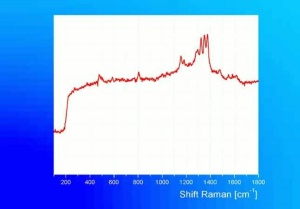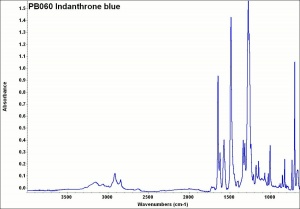Difference between revisions of "Indanthrone blue"
(username removed) |
m (Text replace - "== Authority ==" to "== Sources Checked for Data in Record ==") |
||
| (One intermediate revision by one other user not shown) | |||
| Line 1: | Line 1: | ||
== Description == | == Description == | ||
| − | A synthetic blue [ | + | A synthetic blue [[anthraquinone dye]]. Indanthrone blue was first prepared as an [[anthraquinone]] derivative of indigo by Rene Bohn in 1901. He named the colorant indanthrene, but the name was changed to indanthrone when Indanthrene® became a brand name [I.G.Farbenindustrie A.G.] for the colorant. Indanthrone is rarely used as a colorant because it is similar in hue to [[phthalocyanine blue]] but is more expensive. |
== Synonyms and Related Terms == | == Synonyms and Related Terms == | ||
| Line 32: | Line 32: | ||
M.de Keijzer, "Microchemical Analysis on Synthetic Organic Artists Pigments Discovered in the Twentieth Century" in ICOM Preprints, Dresden 1990, p. 221-225. | M.de Keijzer, "Microchemical Analysis on Synthetic Organic Artists Pigments Discovered in the Twentieth Century" in ICOM Preprints, Dresden 1990, p. 221-225. | ||
| − | == | + | == Sources Checked for Data in Record == |
* M. Doerner, ''The Materials of the Artist'', Harcourt, Brace & Co., 1934 | * M. Doerner, ''The Materials of the Artist'', Harcourt, Brace & Co., 1934 | ||
Revision as of 06:36, 1 May 2016
Description
A synthetic blue Anthraquinone dye. Indanthrone blue was first prepared as an Anthraquinone derivative of indigo by Rene Bohn in 1901. He named the colorant indanthrene, but the name was changed to indanthrone when Indanthrene® became a brand name [I.G.Farbenindustrie A.G.] for the colorant. Indanthrone is rarely used as a colorant because it is similar in hue to Phthalocyanine blue but is more expensive.
Synonyms and Related Terms
Indanthrene® blue [I.G.Farbenindustrie A.G.]; Pigment Blue 60; CI 69800; Vat Blue 4; indanthrene blue R; indanthrene brilliant blue FF; anthraquinone blue; faience blue
Other Properties
Turns orange then dissolves in concentrated sulfuric acid. Insoluble in organic solvents.
UV max = 278 nm
| Composition | C28H14N2O4 |
|---|---|
| Molecular Weight | mol. wt. = 442.43 |
Hazards and Safety
Closely related to cancer causing anthraquinones.
Additional Information
M.de Keijzer, "Microchemical Analysis on Synthetic Organic Artists Pigments Discovered in the Twentieth Century" in ICOM Preprints, Dresden 1990, p. 221-225.
Sources Checked for Data in Record
- M. Doerner, The Materials of the Artist, Harcourt, Brace & Co., 1934
- Website address 1 Comment: www.straw.com/sig/dyehist
- Website address 2 Comment: http://www.coloria.net/variti.htm - gives as C34H16O2 for PB65, vat blue 20, CI 59800 and as C28H14N2O4Cl3 for PB21, CI 69835
- A.Scharff, 'Synthetic dyestuffs for textiles and their fastness to washing', ICOM-CC Preprints Lyon, Getty Conservation Institute, Los Angeles, 1999
- Monona Rossol, The Artist's Complete Health and Safety Guide, Allworth Press, New York, 1994
- Art and Architecture Thesaurus Online, http://www.getty.edu/research/tools/vocabulary/aat/, J. Paul Getty Trust, Los Angeles, 2000

